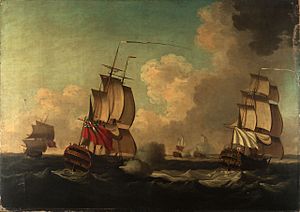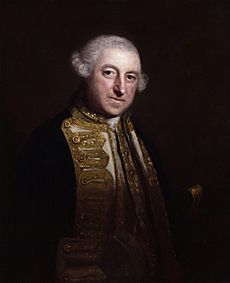Action of 8 June 1755 facts for kids
Quick facts for kids Action of 8 June 1755 |
|||||||
|---|---|---|---|---|---|---|---|
| Part of the French and Indian War | |||||||
 The Capture of the 'Alcide' and 'Lys' unknown 18th century artist |
|||||||
|
|||||||
| Belligerents | |||||||
| Commanders and leaders | |||||||
| Edward Boscawen | Toussaint Hocquart | ||||||
| Strength | |||||||
| 3 ships of the line | 3 ships of the line; one en flûte | ||||||
| Casualties and losses | |||||||
| 7 killed 25 wounded |
2 ships of the line captured 130 killed and wounded 2,000 prisoners |
||||||
The Action of 8 June 1755 was a naval battle between France and Great Britain. It happened early in the French and Indian War. During this fight, the British captured two French ships, the Alcide and the Lys. This happened near Cape Ray, Newfoundland, in the Gulf of St. Lawrence. This battle helped lead to the official start of the Seven Years' War in 1756.
Why the Battle Happened
In 1754, French and British forces in North America started fighting. They were arguing over who controlled the Ohio River valley. This area is near where Pittsburgh, Pennsylvania is today.
When leaders in London (Great Britain) heard about these fights, they decided to send soldiers. Their goal was to take over the area where the French had built Fort Duquesne.
France found out about Britain's plans. So, they quickly got their own ships ready to send soldiers to North America. The Royal Navy (Britain's navy) knew what France was doing. They sent Vice Admiral Edward Boscawen with a fleet of eleven large warships. His job was to stop French ships heading for Quebec City in the Gulf of St. Lawrence. Boscawen patrolled along the southern coast of Newfoundland. A few weeks later, another British fleet was sent to help.
Most of the French fleet, led by Admiral Dubois de la Motte, avoided the British ships. Many of their ships reached Louisbourg. Some even got past Boscawen's fleet and made it to Quebec. However, three French ships got separated from the main fleet in thick fog. These three ships then ran into some of Boscawen's ships.
The Battle Begins
The British ships HMS Dunkirk, HMS Defiance, and HMS Torbay found the French ships Dauphin Royal, Alcide, and Lys. These French ships were under the command of Toussaint Hocquart.
The Lys was sailing en flûte. This means it was carrying soldiers and supplies, not its full number of cannons. It only had 22 cannons because it was carrying eight companies of French soldiers. The Alcide was a larger warship with 64 guns.
Hocquart, from the Alcide, called out to the British commander, Richard Howe, "Are we at war, or at peace?" The British replied, "At peace, at peace." But after a short talk, the British ships opened fire on the three French ships.
The Alcide was better armed than the other two French ships. It fought back for five hours. But after taking a lot of damage, it surrendered along with the Lys. The Dauphin Royal managed to escape in the fog.
What Happened Next
After this battle, and more actions where British ships bothered French shipping, the two countries officially declared war. This happened in the spring of 1756.
The French soldiers captured in this battle were meant to serve in New France (Canada). They were held as prisoners of war on Georges Island in Halifax Harbour.
Interestingly, this was the third time that the French commander Hocquart became a prisoner of Admiral Boscawen. Boscawen had captured him in a smaller ship battle in 1744. Then again in the First Battle of Cape Finisterre (1747). And finally, in the Alcide during this battle.
 | James B. Knighten |
 | Azellia White |
 | Willa Brown |


